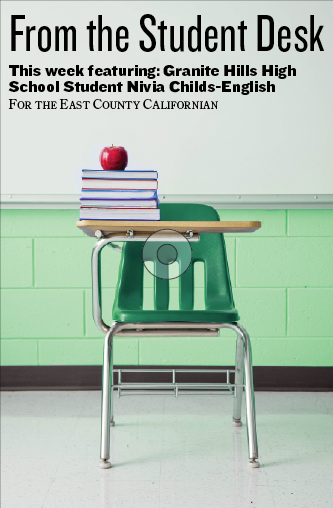Most students know how easy it is to feel overwhelmed by school. One Eagle on campus has some free advice.
David Awakim is a junior at Granite Hills High School who has gone above and beyond when it comes to making the most of his high school experience. He has already started to knock out some of his general education courses for college by taking advanced classes both on and off his high school’s campus. He is currently an International Baccalaureate Diploma (IB) student, meaning each of his classes is taken at the IB level, which is similar to the Advanced Placement (AP) level, but a great deal more strenuous. According to the IB Organization, to obtain the IB diploma David must pass the exams associated with all of his IB classes, take Theory of Knowledge, “in which students reflect on the nature of knowledge and on how we know what we claim to know,” as well as complete an extended essay, “which is an independent, self directed piece of research, finishing with a 4,000 word essay.”
However, David said he is up to challenge.
“I want to succeed,” he said. “I have ambition, if I see a challenge, then I will take it, plus I like all these subjects. I learn more in these IB classes, plus I like learning.”
David isn’t solely focused on academics, he started taking the theatre class offered at Granite Hills in his freshman year.
“Taking theatre was definitely a big help in me becoming more vocal and outgoing,” he said. He also has a job at the El Cajon Library working a few hours a week, he plays tennis and is a member of the Academic League team.
The highest level math class at Granite Hills is AP Calculus, typically only taken by seniors, but David passed the AP Calculus exam in his sophomore year, scoring a five out of five, so now he takes the differential equations math class at Grossmont Community College this semester.
“Math is my forte,” David said. He has no grade less than an A on his transcript, but because he took theatre and college prep physics he is ranked sixteenth in his class, yet he has taken more classes than almost all students ranked higher than him.
Denise Pope, an education scholar at Stanford University used survey data to examine a pool of 4,217 students. Her research was published in the Journal of Experimental Education, she found that 56 percent of the students considered homework a primary source of stress, according to the survey data. Forty-three percent viewed tests as a primary stressor, while 33 percent put the pressure to get good grades in that category. Fewer than one percent of the students said homework was not a stressor.
To combat this stress David relaxes on his bed and takes a long bath. David’s advice to students struggling is, “to realize that high school isn’t your entire left, America is all about succeeding and overcoming your background and opportunities there will always be opportunities.”
He also advises students to not stress about work. He suggests that if you’re stressing about science homework then do English homework for a while.
With top universities becoming more and more competitive, high school students are burning out trying to look good to appeal to these schools. We high schoolers should all keep David’s advice in mind as we prepare ourselves for entering into the next stage after high school.













